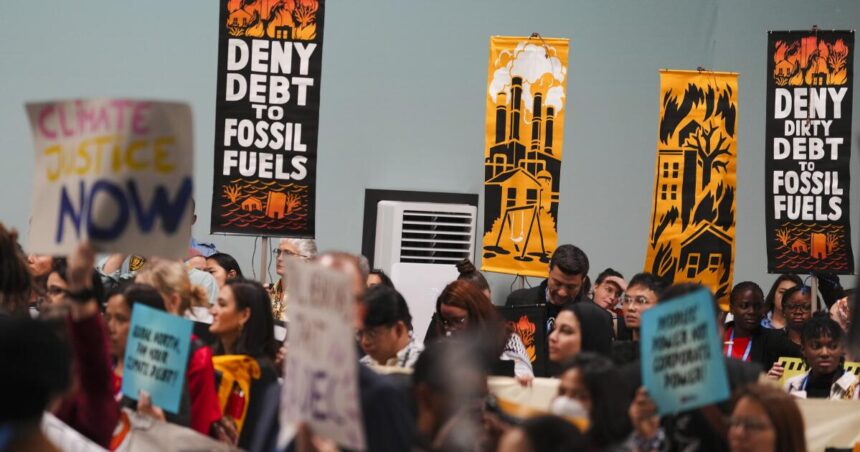Hundreds of activists formed a human chain outside one of the main plenary halls at the United Nations climate summit, which aims to curb warming from coal, oil and natural gas.
The demonstration in Baku, Azerbaijan, will be echoed at sites around the world in a global “day of action” for climate justice that’s become an annual event.
Activists waved flags, snapped their fingers, and hummed and mumbled chants in a silent protest, with many covering their mouths with the word “Silenced.”
Demonstrators held up signs calling for more money to be pledged for climate finance, which involves cash for transitioning to clean energy and adapting to climate change. It comes as negotiators at the venue try to hammer out a deal for exactly that — but progress has been slow and observers say the direction of any agreement is still unclear.
Environmental advocates have also decried fossil fuel industry influence at the , which are .
Activists vow to ‘increase the pressure’
Lidy Nacpil said protesters like her are “not surprised” about how negotiations are going. But past wins — like a loss and damage fund that gives developing nations cash after extreme weather events exacerbated by climate change — keep organizers going, said Nacpil, a coordinator with the Asian Peoples’ Movement on Debt and Development.
“The role we play is to increase the pressure,” she said of the action. “We know we’re not going to get the results that the world needs in this round of negotiations, but at least to bring us many steps closer is our hope is our aim.”
Negotiators at COP29 are working on a deal that might be worth hundreds of billions of dollars to poorer nations. Many are in the Global South and already suffering the costly impacts of weather disasters fueled by climate change. Several experts have said $1 trillion a year or more is needed both to compensate for such damages and to pay for a clean-energy transition that most countries can’t afford on their own.
Samir Bejanov, deputy lead negotiator of this year’s climate talks, said in a news conference that the climate finance talks were moving too slowly.
“I want to repeat our strong encouragement to all parties to make as much progress as possible,” he said. “We need everyone to approach the task with urgency and determination.”
Observers were also disappointed at the pace of progress.
“This has been the worst first week of a COP in my 15 years of attending this summit,” said Mohamed Adow, of climate think tank Power Shift Africa. “There’s no clarity on the climate finance goal, the quality of the finance or how it’s going to be made accessible to vulnerable countries.”
“I sense a lot of frustration, especially among the developing country blocks here,” he said.
Panama environment minister Juan Carlos Navarro agreed, telling the Associated Press that he is “not encouraged” by what he’s seeing at COP29 so far.
“What I see is a lot of talk and very little action,” he said, noting that Panama is among the group of countries least responsible for warming emissions but most vulnerable to the damage caused by climate change-fueled disasters.
“We must face these challenges with a true sense of urgency and sincerity,” he said. “We are dragging our feet as a planet.”
A letter signed by former U.N. chief Ban Ki-Moon, former U.N. climate secretary Christiana Figueres and former Ireland President Mary Robinson called for “a fundamental overhaul of the COP.” “We need a shift from negotiation to implementation,” it said.
Instead of spending so much effort negotiating new deals in annual conferences that can attract 70,000 people, the process should be smaller and more frequent and aimed at putting what was already agreed on into action, said one of the signees, Johan Rockstrom, director of the Potsdam Institute for Climate Impact Research.
Walling, Arasu and Borenstein write for the Associated Press. AP writer Dorany Pineda in Los Angeles contributed to this report.










